In the ever-evolving landscape of retail, omnichannel fulfillment has become a crucial strategy for businesses seeking to meet the demands of modern consumers. As customers increasingly expect seamless shopping experiences across various channels, from online to in-store, businesses must adapt to stay competitive. This blog explores the benefits, challenges, and strategies associated with omnichannel fulfillment, providing insights into how businesses can navigate this complex terrain.
Benefits of Omnichannel Fulfillment
- Enhanced Customer Experience: Omnichannel fulfillment allows customers to shop and receive products through their preferred channels, whether it’s online, in-store, or via mobile. This flexibility enhances the overall shopping experience, fostering customer loyalty and satisfaction.
- Increased Sales and Revenue: By offering multiple purchasing and fulfillment options, businesses can reach a broader audience and capture more sales opportunities. Customers are more likely to complete purchases when they can choose the most convenient fulfillment method.
- Better Inventory Management: Omnichannel fulfillment requires businesses to integrate their inventory systems across all channels. This integration provides a unified view of inventory, reducing the risk of stockouts and overstocks, and enabling more efficient inventory management.
- Competitive Advantage: Companies that successfully implement omnichannel fulfillment can differentiate themselves from competitors by offering superior customer service and convenience. This competitive edge can lead to increased market share and brand loyalty.
Challenges of Omnichannel Fulfillment
- Complex Logistics: Coordinating fulfillment across multiple channels involves complex logistics. Managing inventory, processing orders, and ensuring timely delivery across various locations and methods can be challenging.
- Technology Integration: Implementing an effective omnichannel strategy requires integrating various technologies, such as order management systems (OMS), warehouse management systems (WMS), and customer relationship management (CRM) platforms. Ensuring these systems work seamlessly together can be difficult and costly.
- Cost Management: Offering multiple fulfillment options can increase operational costs, including shipping, warehousing, and labor. Balancing these costs while maintaining profitability is a significant challenge for businesses.
- Data Management: Omnichannel fulfillment generates vast amounts of data from different sources. Collecting, analyzing, and leveraging this data to make informed decisions requires robust data management practices and tools.
Strategies for Successful Omnichannel Fulfillment
- Unified Inventory Management: Implement a centralized inventory management system that provides real-time visibility across all channels. This system should track inventory levels, locations, and movements, enabling efficient order fulfillment and reducing the risk of stock discrepancies.
- Invest in Technology: Invest in advanced technology solutions that support omnichannel fulfillment. This includes OMS, WMS, CRM, and analytics tools. These technologies should be integrated to ensure smooth operations and data flow across all channels.
- Flexible Fulfillment Options: Offer a variety of fulfillment options, such as buy online, pick up in-store (BOPIS), ship from store, and curbside pickup. Providing flexible options caters to different customer preferences and enhances the shopping experience.
- Optimize Logistics: Streamline logistics processes to ensure efficient order processing and delivery. This may involve partnering with third-party logistics providers, optimizing warehouse layouts, and using advanced shipping solutions.
- Leverage Data Analytics: Utilize data analytics to gain insights into customer behavior, inventory trends, and operational performance. Use this information to make data-driven decisions, optimize inventory levels, and improve fulfillment processes.
- Focus on Customer Communication: Maintain clear and consistent communication with customers throughout the fulfillment process. Provide updates on order status, estimated delivery times, and any potential delays. Effective communication builds trust and enhances customer satisfaction.
- Continuous Improvement: Continuously monitor and evaluate your omnichannel fulfillment strategy. Collect feedback from customers and employees, identify areas for improvement, and implement changes to enhance efficiency and effectiveness.
Conclusion
Omnichannel fulfillment is essential for businesses looking to thrive in the modern retail environment. While it presents several challenges, the benefits of enhanced customer experience, increased sales, and competitive advantage make it a worthwhile investment. By implementing effective strategies and leveraging advanced technologies, businesses can overcome the complexities of omnichannel fulfillment and deliver seamless shopping experiences that meet the expectations of today’s consumers.









